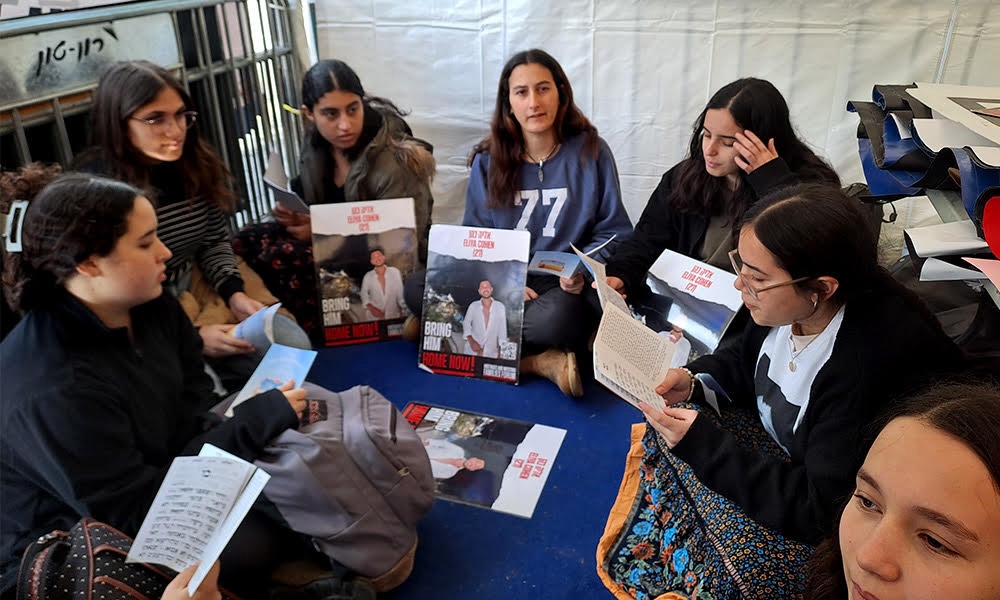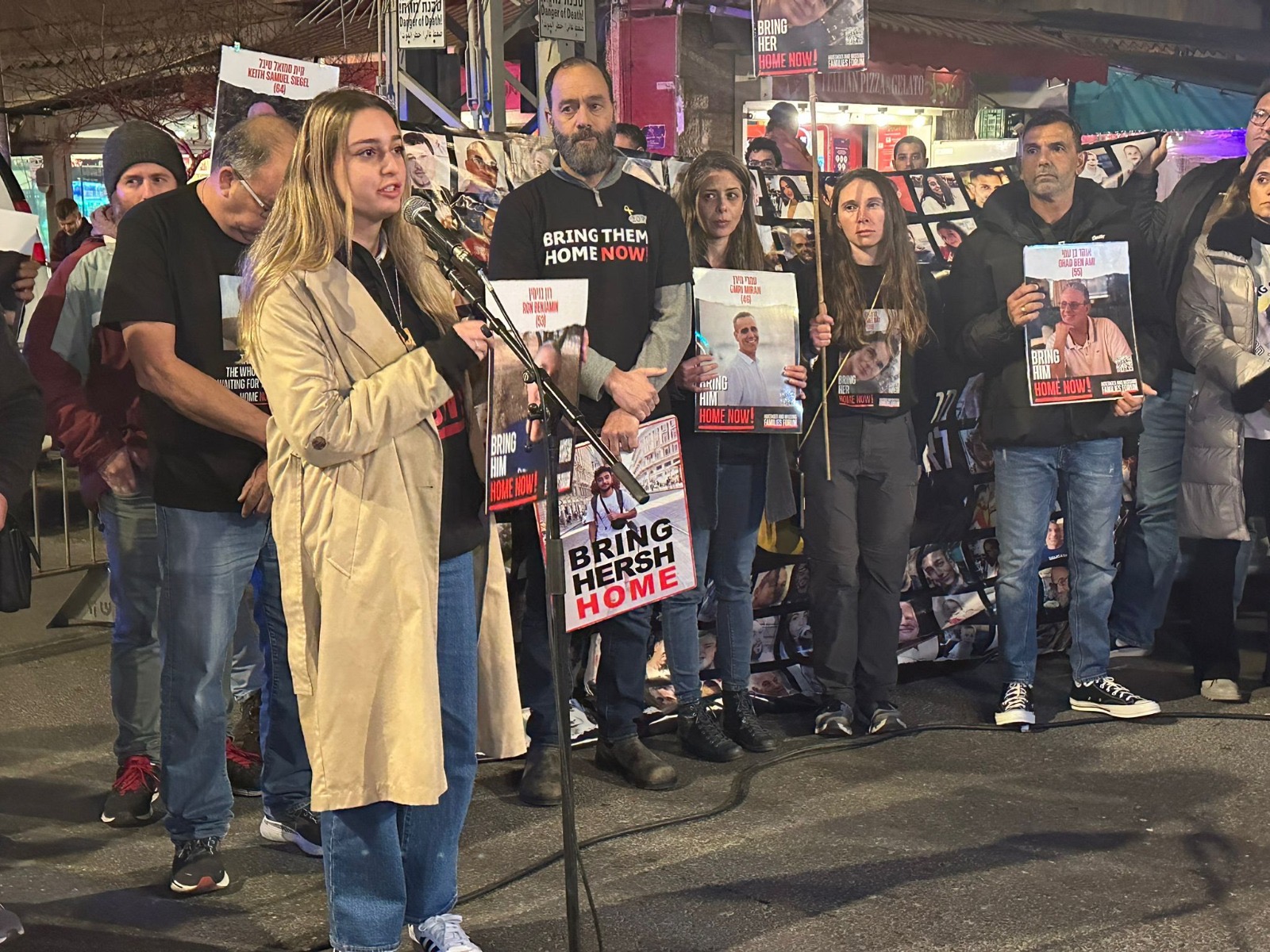
Daniel Lifshitz stands in the unrelenting, freezing rain outside the tent set up near Prime Minister Benjamin Netanyahu’s official residence in Jerusalem by family members of the hostages still captive in Gaza.
Like the dozen or so others beside him, Lifshitz is holding a large sign. His has a picture of his grandfather, Oded Lifshitz, 83, who was seized by Hamas terrorists from his home on Kibbutz Nir Oz during the October 7 attack.
Oded Lifshitz and his wife, Yocheved, 85, were among the approximately 250 hostages that the terrorists captured on that day. Some 1,200 other people were also killed. Subsequently, one hostage was freed by the IDF forces, and dozens, including Yocheved Lifshitz, were released in a prisoner-exchange deal with Hamas in November. An estimated 136 hostages remain in Gaza; an unknown number, perhaps as many as 30, are presumed to be dead. Another three hostages had escaped their captors and were killed by Israeli soldiers who mistook them for militants.
“My grandparents are amazing people—proud Jews, Zionists and Israelis, dedicated to peace,” says Lifshitz, 35, a former goalie in Israel’s Premier Soccer League and currently a wine importer. “My grandfather is still there, somewhere in Gaza. He is elderly and he was wounded. All his life, he has been dedicated to human rights and peace, and he should be brought home immediately. All the hostages should be brought home—now.”
Armed guards prevent the family members from getting any closer to the prime minister’s residence. The traffic is heavy, and drivers honk loudly as they pass by. Lifshitz waves at them and says, “This is what I can do—stand here to make sure that the public never forgets our family members and to make sure that, when a deal comes to the table, Netanyahu and his government will take it and bring the hostages home, no matter what the price.”
Inside the tent, which was put up by the Hostages and Missing Families Forum, an ad hoc volunteer group that provides logistical support, along with PR, including visits abroad to Jewish communities and foreign government officials, and other services to the families, it is warm and crowded. A table is filled with coffee makers, regular milk, oat milk, teas and cookies (some marked gluten free). A dozen students from a nearby high school, accompanied by their teacher, have lugged over huge vats of steaming vegetable and lentil soup. In somber silence, they listen as a former hostage hesitantly talks about her experiences, repeating frequently, “It was so bad, it was so bad.”
A group of religious high school girls sit in a circle, fervently reciting psalms. They have come with their schoolmate Michal Cohen, whose brother Eliya, 27, is also a hostage in Gaza and hold signs with his picture.
“I am so worried about my brother,” Michal, 17, says quietly. “It hurts so much. But the support of my friends and of the entire people of Israel gives us some comfort.”
Public Outcry for the Return of Hostages
Since the “Iron Swords” war began, Netanyahu has repeatedly stated that Israel has two intertwined and simultaneous goals: to wipe out Hamas and to bring the hostages home. Initially, there seemed to be extensive support for the two, bolstered by the fact that the army was able to extract one captive soldier in a daring rescue.
But as the fighting continues and the Israeli casualties—more than 200 at the time of writing—increase, there is growing doubt about whether Israel can actually decisively defeat and destroy Hamas. More than three months into the war, which has killed over 25,000 in Gaza, Hamas is still standing and firing rockets into Israel. While Israel has assassinated mid-level Hamas commanders, Hamas leaders are still alive and able to call the shots.
According to a survey conducted for the Families Forum by Midgam, a market research and opinion polling company in Israel, 72 percent of the general public supports the families’ calls to make the return of the hostages Israel’s top priority. Saturday night, tens of thousands attended the weekly demonstrations in Jerusalem and Tel Aviv, organized by the Hostages and Missing Families Forum. Speakers, including hostages who had been released as well as former IDF spokespersons, called for an immediate agreement with Hamas to release the 136 hostages still held in Gaza.
“Without the return of the hostages, no citizen in the country is safe!” declared former IDF Spokesman Avi Benayahu. “It’s either a deal, or a death sentence.”
Over the past week, some of the details of the high-level negotiations in Paris between Israel’s intelligence agencies, their U.S. and Egyptian counterparts and Qatari officials have been made public. It would appear that Hamas will not settle for less than a permanent cease-fire, the release of large numbers of Palestinian prisoners held by Israel (perhaps all, estimated as close to 9,000, including about 1,000 who either participated in the October 7 attack or have been captured since), and guarantees that Hamas leaders will be safe from Israeli assassination and that Hamas will continue to rule in Gaza.
Demands that the government agree to such a plan are growing, spurred by the families. In late January, dozens of family members of hostages held by Hamas stormed a committee meeting in Israel’s parliament, demanding a deal to win their loved ones’ release. In contrast, a small group of families, which calls itself Tzav 9 (after the name for the emergency call-up of IDF reservists), has been protesting at the crossings into the Gaza Strip, trying to prevent Israel from handing over medicines, food and other humanitarian aid to the Gazans until the hostages are returned and now are planning to march to Jerusalem.“No aid to murderers,” the group says.
In response to the families’ increasingly vocal demands, government officials have somewhat reworded their goals to state that only military pressure will lead to a hostage deal. Speaking with families of hostages early this week, for instance, Defense Minister Yoav Gallant said, “There are initial signs that reaching Hamas’ most sensitive sites advances us toward achieving the war’s two main goals.”
Furthermore, Gallant notes, a cessation of the fighting would leave the hundreds of thousands of Israelis who were forced from their homes in the Western Negev and along the northern border unable to return because as long as Hamas remains in power in Gaza, there’s a threat of a repeat of October 7.
What are the Political Ramifications of the Hostage Dilemma?
The tension is giving Netanyahu a serious political headache. Opinion polls show that he is losing public support. Earlier this week, Channel 12, Israel’s leading private television station, published a poll showing that fewer than a quarter of Israelis support him over his rival, Benny Gantz, a former general and defense minister who heads the National Unity party and joined Netanahyu’s government as minister without portfolio as part of the war cabinet.
Demonstrations for Netanyahu’s ouster, which had continued for 38 consecutive weeks until October 7, are slowly returning to the streets, and speakers at the free-the-hostages demonstrations are increasingly presenting the issue of the hostages as part of the overall failings of this government.
“The hostages are stuck there because they’ve been abandoned,” Ruth Yaron, the first person to serve in the position of IDF spokesperson, declared at the Saturday-night demonstration in Tel Aviv. Addressing the government she said, “You, the war cabinet, must make decisions. Don’t talk about the price, don’t weigh our lives against release of the prisoners or the goals of the war. Their lives, and ours, mean much more than that.”

Shay Benjamin addresses a demonstration calling for the return of the hostages, earlier this week. Photo credit: Hostages and Missing Families Forum
But at the same time, right-wing members of Netanyahu’s government, including Finance Minister Bezalel Smotrich, have made it clear that they oppose any release of Palestinian prisoners. National Security Minister Itamar Ben-Gvir has threatened to bolt the coalition if a “reckless” deal were struck and if Netanyahu agrees to a release of the hostages while leaving Hamas in power in Gaza.
Smotrich and Ben-Gvir were among the half-dozen cabinet ministers and 15 or so MKs who attended a rally last week calling for Jewish settlement in the Gaza Strip, which is the only thing, the organizers claim, that can bring security to Israel. While the calls for settlement were met by fervent cheers and ecstatic dancing, there was almost no mention of the hostages.
From the other side, in an interview with Channel 12’s Ilana Dayan, former chief of the general staff of the IDF Gadi Eisenkot, stated clearly that “[T]here was a point in one of the [government’s] discussions where I said that if the subject of the hostages wasn’t going to be advanced then I’m betraying my position and I have nothing to do here.” Also a member of the National Unity party, Eisenkot, whose son was killed in the fighting in Gaza in December, joined the government in December as minister without portfolio as part of the war cabinet.
Netanyahu needs the right-wing to maintain his coalition, and he needs the support of leaders like Eisenkot and Gantz to maintain public credibility and “prove” that he is not neglecting the hostages. Caught between them, he is delivering mixed messages. In a visit to Eli, a settlement in the West Bank, Netanyahu vowed that Israel will not release “thousands of terrorists” or withdraw the IDF from Gaza as part of a deal, and that the war will not end without “total victory” against Hamas. And after leaks indicated the direction in which the negotiations in Paris may be headed, Netanyahu released a video statement in which he said, “We are working to attain another framework to release our captives, but I stress—not at any price.
“We have red lines,” he continued, “including, we will not end the war, we will not pull the IDF out of the Strip, we will not release thousands of terrorists.”
Netanyahu has even taken to blaming the hostages’ families for the lack of progress: At a press conference last week, he said that the protests on behalf of the hostages “only raise” Hamas’s demands and “push off the goal that we all want: the return of all of our hostages.”


Educator Zohar Avigdori, 42, whose family member was released in November, recently participated in a meeting of family members with Netanyahu in which Netanyahu reassured them, Avigdori says, that political considerations would not stand in the way of a possible agreement and that the survival of his government would not be a factor in his decision-making process. “Maybe some of those statements are simply part of the negotiating game, intended to strengthen Israel’s position and protect himself politically,” Avigdori continues. “That being said, we know Netanyahu is a politician and is playing a political game. And that is why we have to stay very alert and make sure that he knows that the hostages have no more time to wait.”
Avigdori says that Netanyahu must also realize “that there is no way that Israeli society can rebuild and heal after October 7 if the hostages are not returned.”
But the mixed messages themselves are taking a toll. “Netanyahu has us on a roller coaster, saying different things, and the pain is unbearable,” says Shay Benjamin, 25, a high-tech employee whose father is being held in Gaza.“ “The government and the army had enough time to demolish Hamas, it’s time to bring our loved ones home.”
“Netanyahu says we will not pay ‘any price.’ But how can you put a price on my father’s life, on any human life?,” Benjamin continues. “How will I be able to establish a home here in Israel and bring up children if Israel becomes a state that abandons its people?”
Top image: Girls reciting psalms. Michal Cohen is 2nd from right. (Photo credit: Eetta Prince-Gibson)

One thought on “Israel Dispatch | The Hostage Dilemma: Is There Really No Price Bibi Will Pay?”
The public needs to hear more about Marwan Barghouti and why Netanyahu doesn’t want to release him as part of the prisoner swap.